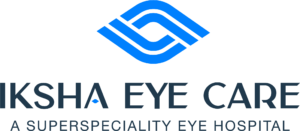
Cataract surgery offers the opportunity to restore clear vision and improve the quality of life. One crucial decision you’ll face during this process is choosing the right intraocular lens (IOL) that will replace your natural lens. This blog aims to guide you through the factors to consider and provide insights to help you make an informed choice for optimal postoperative visual outcomes.
- Understanding Intraocular Lenses
During cataract surgery, artificial lenses called intraocular lenses (IOLs) are inserted to replace the clouded natural lens. IOLs are available in a variety of varieties, each created to meet a particular visual requirement. Mono-focal and premium multifocal or accommodating lenses are the two main classifications. While premium lenses have the potential for a wider range of vision, unlike mono-focal lenses, which only allow clear vision at one distance, they also need less wear of glasses or contact lenses.

- Consider Your Lifestyle and Visual Needs
The first step in selecting the best IOL is to take your lifestyle and visual needs into account. Your ophthalmologist will choose the best IOL for you after talking with you about your daily routine, interests, and employment requirements. Premium multifocal or accommodating lenses can be worth taking into consideration if you lead an active lifestyle or want to wear glasses as little as possible. However, your ophthalmologist may suggest a different type of lens if you have unique visual demands, such as using a computer frequently or driving at night, to improve your visual results.
- Understand the Pros and Cons
Every IOL type has benefits and drawbacks. Reading glasses may still be necessary for close-up work even when mono-focal lenses provide great vision at a defined distance, often distant vision. There is a chance for a wider range of vision, including close, mid, and distant vision, with premium multifocal or accommodating lenses. But some people could see glare, haloes, or decreased contrast sensitivity when using these glasses. You must thoroughly explore the benefits and drawbacks of each IOL type with your ophthalmologist considering your particular situation and expectations.
- Discuss with Your Ophthalmologist
The knowledge of your ophthalmologist is crucial for selecting the best IOL. They will examine your eyes, gauge the severity of the cataract, and consider things like corneal health, ocular dominance, and pre-existing eye problems. They will offer personalized recommendations catered to your requirements based on this assessment. Ask questions, voice any concerns you may have, and make sure you comprehend the advantages and potential drawbacks of each IOL.
- Advanced Technology IOLs and Cost Considerations
There are high-tech IOLs available in addition to mono-focal and premium multifocal/accommodating lenses. Toric lenses for astigmatism correction and extended depth of focus (EDOF) lenses with a wider field of vision are examples of these. For those with certain vision requirements, these specialized lenses might be helpful. It’s crucial to remember, nevertheless, that compared to conventional mono-focal lenses, advanced technology IOLs could be more expensive. With your ophthalmologist, go through the financial issue and take insurance or other payment possibilities into consideration.

- Understanding Your Eye’s Health and Measurements
To determine the most appropriate IOL for your eyes, your ophthalmologist will perform a thorough evaluation. This typically includes measuring the length and shape of your eye, evaluating the corneal curvature, and assessing the health of your retina and optic nerve. These measurements and assessments help in selecting the right power and design of the IOL to optimize visual outcomes. Trust in the expertise of your ophthalmologist and ensure that they have access to accurate and up-to-date measurements to enhance the precision of the lens selection process.
- Postoperative Expectations and Follow-up Care
Understanding the expected outcomes and postoperative care is essential. After cataract surgery, there will be an adjustment period for your eyes to adapt to the new IOL. Your ophthalmologist will provide guidance on activities to avoid during the healing phase and prescribe eye drops for proper healing and prevention of infection. Regular follow-up visits will be scheduled to monitor your progress and address any concerns. Open communication with your ophthalmologist throughout the healing process is crucial to ensure the best possible visual outcome and overall satisfaction with your chosen IOL.

Making the best intraocular lens choice is a crucial choice that may significantly affect your eyesight and way of life. You may confidently make a decision that is in line with your visual needs and preferences by considering a variety of factors, talking with your ophthalmologist, and learning the advantages and limits of various IOL solutions. Keep in mind that cataract surgery will leave you with clear eyesight, and the correct IOL can make the journey even more pleasant.




